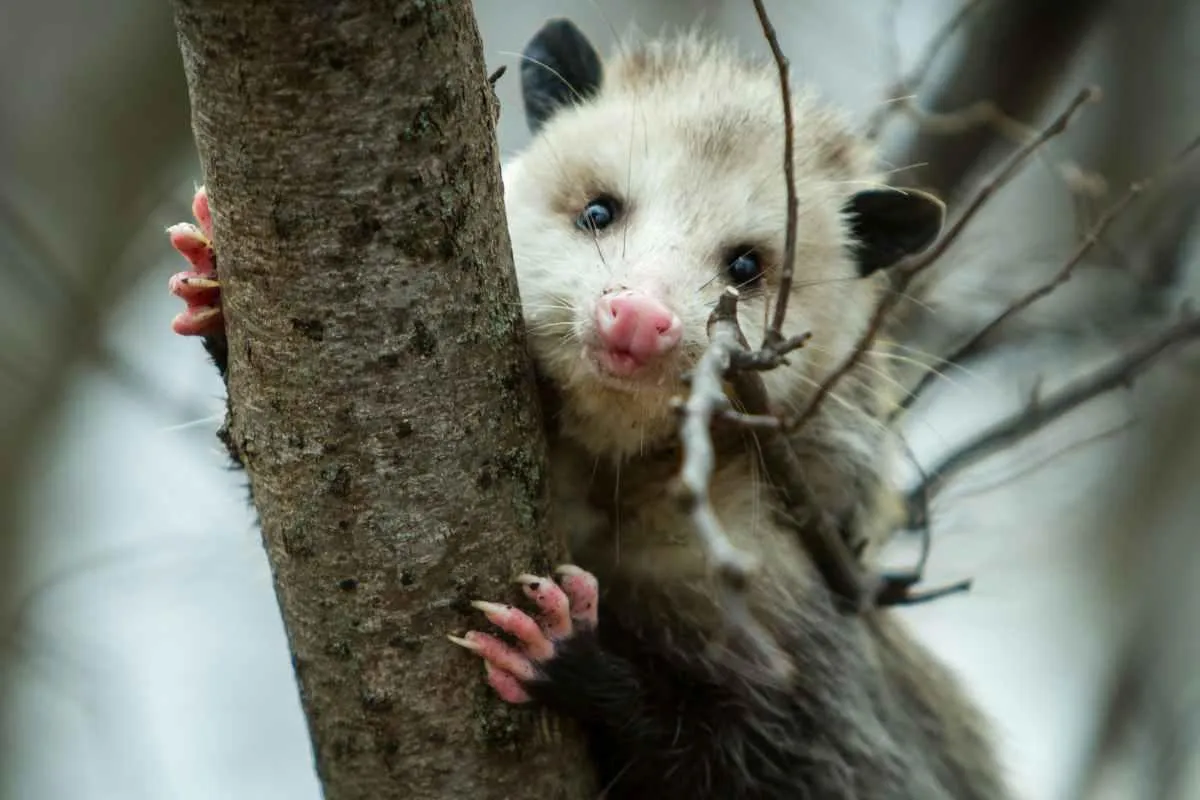Blog
Explore insightful and informative pest control blogs

Opossum Good for Environment: Natural Pest Controllers
Opossums are natural pest controllers, consuming large amounts of insects, rodents, and ticks, helping to manage pest populations and reduce the spread of diseases.
Their significant consumption of ticks, with a single opossum potentially killing thousands per year, makes them crucial in reducing tick-borne diseases like Lyme disease.
Promoting coexistence with opossums and addressing common misconceptions about them can enhance pest control efforts and contribute to a healthier ecosystem.
Opossums play a vital yet often overlooked role in natural pest control. These unique marsupials, native to North America, have an insatiable appetite for various pests, including insects, rodents, and ticks.
Their presence in ecosystems helps manage pest populations effectively, providing a natural and environmentally friendly alternative to chemical pest control methods.
This article explores the significant contributions of opossums to pest control, including their impact on tick, insect, and rodent populations, and offers guidance on coexisting with these beneficial creatures.
The Role of Opossums in Natural Pest Control
Opossums are natural-born pest controllers, equipped with an insatiable appetite for a variety of unwanted critters.
Their diet includes insects, rodents, and even ticks, making them invaluable assets in managing pest populations.
Reducing Tick Populations
Opossums are often hailed as "tick vacuums" due to their remarkable ability to consume these pesky parasites.
A single opossum can devour thousands of ticks in a year, significantly reducing the risk of tick-borne diseases like Lyme disease.
By protecting opossum populations, we can indirectly safeguard human and pet health.
One study published in the "Proceedings of the Royal Society B" found that a single opossum can kill between 5,500 and 6,000 ticks per week (PubMed) (Cary Institute of Ecosystem Studies). This makes opossums effective in controlling tick populations and potentially reducing the spread of tick-borne diseases such as Lyme disease.
Controlling Insect Populations
Opossums are voracious insect eaters, helping to keep populations of various pests in check. Their menu includes a wide range of insects, such as beetles, cockroaches, and grasshoppers. By reducing insect numbers, opossums contribute to healthier gardens, homes, and communities.
Several studies and sources indicate that opossums contribute to pest control by reducing insect populations, which can help alleviate pest infestations in regions with significant insect problems.
Opossums are known to consume a variety of pests, including insects like beetles, cockroaches, and even small rodents (Pest Info) (Regional Wildlife Services) (WDFW).
Managing Rodent Populations
Opossums are opportunistic feeders that readily consume small rodents, including mice and rats. By preying on these pests, they help to prevent infestations in homes, businesses, and agricultural areas.
This natural rodent control method offers a safer and more environmentally friendly alternative to traditional pest control measures.
Comparing opossums to other rodent control methods, such as traps or poisons, reveals the advantages of this biological approach.
Opossums pose no harm to humans or pets and do not require ongoing maintenance or replacement.
Additionally, they contribute to overall ecosystem health by controlling rodent populations.
Dealing with an opossum now? Contact us for expert wildlife removal!
I Have an Opossum in My House. What Should I Do?

Finding an opossum in your house can be surprising, but there's no need to panic. Opossums are generally harmless and can be safely removed without causing harm to the animal or your property. Here are the steps you should follow if you encounter an opossum in your home:
Remain Calm and Assess the Situation
Opossums are non-aggressive and are likely more scared of you than you are of them.
Observe the opossum's behavior from a safe distance to determine if it appears injured or trapped.
Do Not Attempt to Handle the Opossum
Avoid trying to pick up or move the opossum with your hands as they may bite if they feel threatened.
Use gloves and protective clothing if you need to be near the opossum.
Create an Exit Path
Open doors and windows to provide an easy escape route for the opossum.
Turn off lights and reduce noise to encourage the opossum to leave on its own.
Use a broom or other long object to gently guide the opossum towards the exit without making direct contact.
Calling a Pest Control Professional
While it is possible to handle an opossum situation on your own, there are times when calling a pest control professional for wildlife removal is the best course of action.
Here’s why and when you should consider seeking professional help:
Expertise and Experience
Pest control professionals have the training and experience to safely and humanely handle wildlife removal.
They are familiar with local regulations regarding wildlife and can ensure that the opossum is relocated legally and ethically.
Safety Concerns
If the opossum appears injured or sick, a professional can handle the animal safely and provide it with the necessary care.
Professionals can minimize the risk of injury to both the homeowner and the opossum.
Difficult Access
If the opossum is in a hard-to-reach area, such as an attic, crawl space, or inside walls, a professional has the tools and techniques to remove it effectively.
They can also assess and repair potential entry points to prevent future intrusions.
Need help with an opossum in your home? Reach out to us for professional removal services!
Safe Coexistence with Opossums
Many people fear opossums due to misconceptions about their behavior.
However, these animals are generally harmless and can coexist peacefully with humans.
By providing suitable habitat and food sources, homeowners can attract opossums to their property without experiencing conflicts.
To create an opossum-friendly environment, consider the following tips:
Provide shelter: Create a safe space for opossums to rest, such as a brush pile or nesting box.
Offer food sources: Supplement natural food supplies with fruits, vegetables, and birdseed.
Secure garbage: Prevent opossums from accessing food scraps by using secure garbage cans.
Manage pets: Supervise pets to prevent interactions with opossums.
By taking these precautions, homeowners can enjoy the benefits of opossum pest control while minimizing potential problems.
Facts About Opossums

Marsupials: Opossums are the only marsupials native to North America.
Nocturnal Creatures: They are primarily active at night and sleep during the day.
Diversified Diet: Opossums are omnivores, eating fruits, vegetables, insects, small animals, and carrion.
Pest Control Helpers: They help control pest populations by eating insects, snails, and rodents.
Playing Dead: When threatened, opossums may "play dead," entering a catatonic state to avoid predators.
Prehensile Tail: They have prehensile tails that they use for balance and grasping objects, though they do not hang from them as commonly believed.
Low Body Temperature: Their low body temperature makes them less susceptible to rabies.
Grooming Behavior: Opossums are meticulous groomers, helping them control parasites.
Short Lifespan: In the wild, opossums typically live only 2-4 years.
Solitary Animals: Except during mating season or when females are raising young, opossums are solitary.
Strong Immune System: They have a high resistance to snake venom and can consume venomous snakes.
Addressing Common Misconceptions
To effectively promote opossums as beneficial animals, it is essential to address common misconceptions.
Many people believe that opossums carry rabies or are aggressive towards humans. However, these claims are unfounded. Opossums rarely contract rabies, and they typically avoid confrontation.
Another myth is that opossums are dirty animals. In reality, they are meticulous groomers, spending a significant amount of time cleaning their fur to remove parasites and dirt.
Some people think opossums are pests because they raid garbage cans. This behavior can be managed by securing trash and removing attractants.
There is also a misconception that opossums are destructive to property. Generally, they are non-destructive and do not cause structural damage.
Encountered an opossum? Get in touch for safe and humane wildlife removal!
Wrapping Up: Opossums as Natural Pest Controllers

Understanding the role of opossums in natural pest control reveals their importance in maintaining balanced ecosystems and protecting human health.
By consuming large quantities of ticks, insects, and rodents, opossums help reduce the prevalence of pests and the diseases they carry.
Promoting the protection and coexistence with opossums can enhance our pest management efforts while preserving the environment.
By addressing common misconceptions and adopting opossum-friendly practices, homeowners can enjoy the benefits these remarkable animals offer, contributing to a healthier and more harmonious living space.
Frequently Asked Questions About Opossum Good for Environment
Are opossums good to have around?
Yes, opossums are good to have around because they play a vital role in natural pest control by consuming large amounts of insects, rodents, and ticks, which helps to manage pest populations and reduce the spread of diseases.
Do possums keep snakes away?
Possums do not specifically keep snakes away, but their presence can indirectly reduce the number of snakes by consuming small rodents that attract snakes.
What are the environmental needs of opossums?
Opossums need environments that provide food sources like fruits, insects, and small animals, along with shelter options such as brush piles, tree hollows, or abandoned burrows to thrive.
Craving a Superior Pest Control Solution?
COMPANY STORY
& EXPERIENCE
Craig Broadhead started his pest business in 2004 in California, called Pacific Pest Control. In 2021, he sold his business and moved his family to Arkansas to start fresh with a new vision of Network Pest Control. His goal it to make sure each customer has the best experience possible.


Network Pest Control
11205 Meadow Lark Rd. Rogers AR 72756
479.888.4249
